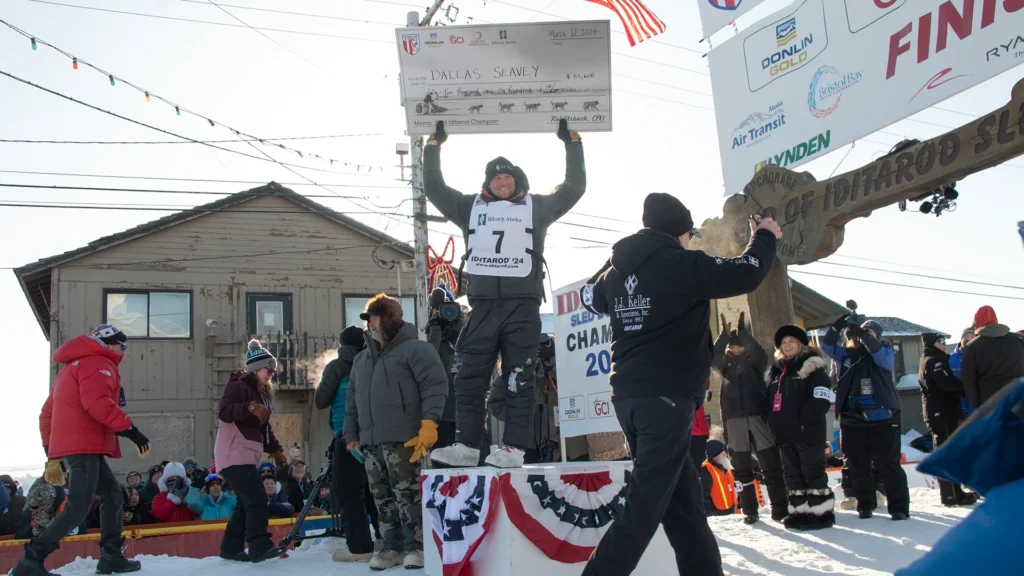Crossing under the burled arch in Nome at 4:13 a.m. Wednesday, Dallas Seavey was crowned the champion of Iditarod 43, marking the young musher’s third victory in the Last Great Race in the last four years.
“Got ‘er done,” Seavey said, barely winded by the run along Front Street and across the finish line. “Make it three.”
Seavey led his finishing team of nine dogs on the line and one in his sled—headed by young leaders Reef and Hero—to the Nome finish line after a straightforward run from his 8-hour layover in White Mountain. Lacking any of the last-minute surprises that led to his victory last year, when dramatic weather resulted in a last-minute scratch by frontrunner Jeff King and reshuffling the race in Seavey’s favor, Seavey said his more placid run to victory in Nome this year was a result of passion for the sport, and his team.
“So far, I’ve just been doing what I love,” he told the crowd. “Mushing dogs, making it fun, keeping it fun. And it seems as long as you take care of the dog team, make good decisions, good things will happen. The wins are a result of doing what we love.”
Seavey was always near the race’s frontrunners, sticking to a routine of generous rest and strong fast runs, but didn’t pull ahead until the coast. He spent just five minutes in the Unalakleet checkpoint, moving ahead of then-first-place Aaron Burmeister, who wrestled the lead away from Seavey through Shaktoolik but was overtaken again by Seavey just miles from Koyuk.
From there Seavey slowly but surely expanded his lead along the coast, ultimately arriving into White Mountain more than four hours ahead of his competitors. His pace didn’t let up in the final 77 miles from White Mountain, through Safety, and on to Nome—in fact, none of his competitors had even reached Safety by the time Seavey had won it all.
After being official declared the race winner, Seavey said using that speed effectively—including knowing when to reign it in and conserve it for later—was one of the most challenging aspects of the race.
“I think restraint’s one of the best qualities of an endurance racer. You have to be patient. You have to wait. You have to have confidence in your team. And when you’re sitting in Kaltag and there’s five teams that could easily win this race, you want to get it over with. You want to race out in front and prove that your team’s the best and get a lead and then be comfortable with that lead. But I had to hold back. And I kept taking long rests. And I had to have a lot of confidence with the dogs. And that was a really big challenge. To be patient and let them mature over time and let some of our competition run themselves out.”
Seavey finishes the 2015 race—which for only the second time in its history included a Fairbanks restart after poor snow conditions along the traditional Southcentral route—with a total trail time of eight days, 18 hours, 13 minutes and six seconds.
For his first place finish Seavey wins a $70,000 purse and a new Dodge pickup truck.
Currently his father, 2013 race champion Mitch Seavey, was the second musher into Nome, arriving at 8:22 a.m. with 10 dogs. Still following into Nome is Burmeister, who is due in Nome within the hour.







